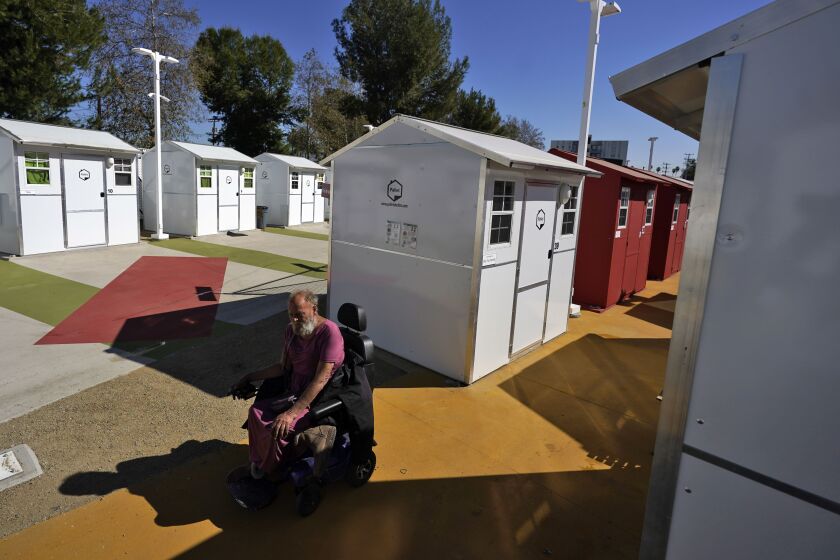Backers hope Tiny Homes will be trialled in Chicago
By all appearances, the great American love affair with stuff, and with big things to accommodate them, continues unabated.
People who can afford buy big houses and big garages to store their belongings. We crave giant TV screens and big SUVs that usually carry maybe two people. Many pay for self-storage units, an entire home for things we don’t have room for. Whole industries, and a lot of real estate, depend on how we overwhelm.
Many others, of course, cannot afford to do all of this or even have a home. Others just have a different mindset. Thus, in some circles, there is a counter-trend dealing with a simplified life on the cheap. And that inevitably involves the movement for small homes – two small words that can imply big ideas.
Tiny house communities have sprung up in many places – California, Texas and Florida are many examples. There is an active push for small homes in Detroit. Some were built overseas. A host of motivations may be involved. Homes can be stylish places for minimalist living, an Airbnb-like budget offering near beach resorts, or a product designed to help the homeless and those who can’t afford larger accommodation.
Brien Cron, president and founder of Chicago Tiny House, a nonprofit organization, said such houses exist in every state near Chicago. Placement agencies report a few available as short-term rentals in Illinois, mostly in locations far from Chicago. But in the city and in the suburbs? Cron and others involved with this issue said they don’t know of any.
This is a source of frustration for Cron, given that he has been working on the issue for about seven years, as he also strives to get immediate help for the homeless, especially in Uptown. He said he thought he had made progress with former mayor Rahm Emanuel’s staffers, who solicited tiny house proposals in 2018. “That was wrong,” Cron said. “Emanuel was against the whole project from the start.”
Cron said he reached a tentative deal with the city to secure vacant city-owned land in places like Englewood and West Humboldt Park, but those plots were then turned over to contractors to build standard single-family homes. . “It’s been a fight for the land this whole time,” he said.
Now, under the leadership of Mayor Lori Lightfoot, something new is afoot. In his 2023 budget documents, Lightfoot mentioned setting aside $3 million for a pilot project in small homes. Eugenia Orr, spokeswoman for the city’s housing department, didn’t have many details last week, but she said the cost would be taken from federal funds allocated to Chicago to recover from the pandemic.
Orr said the city plans to issue a “request for proposals” for city-owned land in the second quarter of 2023. She had no answer on the scope of the project or what the city would spend its money on, since she already owns the land. Maybe street improvements and sewer hookups are needed to reduce the cost of tiny homes.
Cron said whatever the city does, he hopes it will give fair weight to proposals from nonprofits with a social mission and not simply favor developers. Working with Chicago architecture firm Manske Dieckmann Thompson, Cron said he’s aiming for designs that can be built for around $25,000. Given his own financing costs, Cron hatches a plan in which the tiny houses could be rented out for around $300 a month, which he says would cover his group’s debt while generating cash to build more. others. His houses are said to be around 500 square feet, suitable for one or two people.
Lightfoot Allies describe the Tiny Homes initiative as a result of the city’s experiment with additional housing units such as sheds that can be added to a residential lot. But smaller homes could be a tough sell. Everything will depend on how the developments are designed and managed. Many units built in other states look attractive. Some recall the housing of migrants in “The Grapes of Wrath”. Other plans look little more than glorified tool sheds.
As for those who close their minds to the concept, Cron said, “It’s just ignorance. They don’t know what these homes are and how they can help people.
Some aldermen supported tiny houses. When Emanuel launched his plan, he got support from Ald. Edward Burke (14th). “These tiny homes provide a level of privacy unavailable in crowded and often dangerous homeless shelters,” the Southwest Sider said.
“We certainly don’t want to see the emergence of modern slums or Hoovervilles in our city. Instead, we should explore the possibility of creating nurturing communities of people with a new purpose in life,” Burke said, speaking in 2017.
This is another fair way of summing up a situation of growing needs.

A development serving homeless people in Los Angeles.

/cdn.vox-cdn.com/uploads/chorus_asset/file/24090502/Tiny_Homes_Dallas.jpg)
Comments are closed.